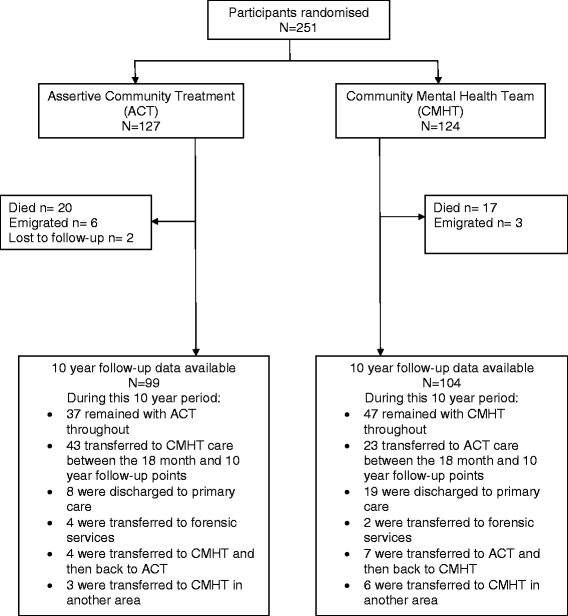Ten year outcomes of participants in the REACT (Randomised Evaluation of Assertive Community Treatment in North London) study
- PMID: 25342641
- PMCID: PMC4210468
- DOI: 10.1186/s12888-014-0296-6
Ten year outcomes of participants in the REACT (Randomised Evaluation of Assertive Community Treatment in North London) study
Abstract
Background: A previous randomised controlled trial that investigated Assertive Community Treatment (ACT) in the UK (the REACT Study) found no clinical advantage over usual care delivered by Community Mental Health Teams (CMHTs) at 18 and 36 month follow-ups. No studies have investigated long term clinical and social outcomes for patients receiving ACT.
Method: We investigated inpatient service use, social outcomes, service contact and adverse events for the 251 REACT study participants 10 years after randomisation through case note review. Data were analysed using regression models adjusted for original treatment group allocation and changes in treatment group.
Results: We found no statistically significant differences in outcomes by original treatment group over the 10 years. Those whose care remained with ACT, or transferred to ACT or forensic services, had more inpatient days over the 10 years (coefficient 223, 95% CI 83 to 363, p = 0.002) than those whose care remained with the CMHTs or were discharged to primary care. Being subject to a Community Treatment Order was associated with a greater chance of being under ACT at 10 year follow-up (OR 6.39, 95% CI 2.98 to 13.70, p <0.001).
Conclusions: The ACT teams in this study showed no clinical advantage over usual care provided by CMHTs at 10 year follow-up. We also found that the ACT teams accrued patients from the original study sample who had more complex needs than those who remained with or transferred to the CMHTs or primary care during this period. Further well conducted trials are needed to identify the most cost-effective approaches to supporting successful community living and optimum long term outcomes for this group.
Figures
References
-
- Department of Health . National Service Framework for Mental Health. London: DH; 1999.
-
- Department of Health . Mental Health Policy Implementation Guide. London: DH; 2001.
Publication types
MeSH terms
LinkOut - more resources
Full Text Sources
Other Literature Sources
Medical


